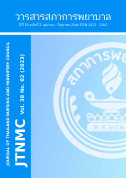Digital Literacy among Nurses Working in a University Hospital
DOI:
https://doi.org/10.60099/jtnmc.v38i02.261436Keywords:
digital literacy, digital technology, registered nursesAbstract
Introduction Digital literacy plays a crucial role in enhancing communication, work, and the improvement of patient care processes to maximize effectiveness and efficiency. Therefore, it is vital for nurses to possess digital literacy in their nursing practices.
Objectives 1) To describe frequency of digital technology usage and digital literacy levels among nurses, 2) To compare digital literacy based on job positions, 3) To compare digital literacy based on job characteristics, and 4) To examine the correlation between digital literacy and work experience in nurses.
Design Descriptive design
Methodology The participants included 530 nurses with at least one year of work experience from the nursing department of a university hospital. Convenience sampling was employed to select the participants. The instruments consisted of four parts: demographic data, experiences with digital technology, digital literacy levels, and barriers encompassing needs and suggestions for digital technology use. The questionnaire was distributed to the participants through a Google form during September-October 2022. Data were analyzed using descriptive and inferential statistics, including Independent t-test and Pearson’s Product Moment Correlation.
Results The majority of participants were registered nurses (86.4%), with over 20 years of experience (38.3%) in direct care (90.2%), and used digital technology daily (63.2%). Participants had a moderate level of digital literacy (46.9%). There were no significant differences in overall digital literacy and its subscales between nurse administrators and practitioners, except for the use of digital media creation programs (t = -3.890, p < .001). Similarly, overall digital literacy and its subscales were not significantly different between nurses with clinical and non-clinical related works, except for the use of digital media creation programs (t = 3.448, p = .001) and word processors (t = -1.983, p = .048). Digital literacy was found to be negatively correlated with work experience (r = -.471, p < .001).
Recommendations Nurse administrators can utilize digital literacy information to plan Individual Development Plans (IDPs) suitable for job positions and characteristics of nurses. Additionally, they should focus on enhancing the use of digital media creation programs for those with long-term work experience.
Downloads
References
Ministry of Public Health. eHealth Strategy, Ministry of Public Health (2017 - 2026). Nonthaburi: Information and Communication Technology Center Office of the Permanent Secretary, Ministry of Public Health; 2017. Available from: https://ict.moph.go.th/upload_file/files/eHealth_Strategy_ENG_141117.pdf. (in Thai)
Office of the Civil Service Commission (OCSC). Digital Literacy Project. [Internet]. 2020 [cited 2022 Jan 11]. Available from: https://www.ocsc.go.th/DLProject/mean-dlp (in Thai)
Longhini J, Rossettini G, Palese A. Digital Health Competencies Among Health Care Professionals: Systematic Review. J Med Internet Res. 2022 Aug 18;24(8):e36414. doi: 10.2196/36414. Erratum in: J Med Internet Res. 2022 Nov 29;24(11):e43721. PMID: 35980735; PMCID: PMC9437781.
Srethasr T. Assessment of Skills and Abilities for Information Technology among Hospital Staff, Khunhan Hospital, Sisaket Province. Journal of Health Science [Internet]. 2014 [cited 2022 Jan 11]; 23(3):485-91. Available from: https://thaidj.org/index.php/JHS/article/view/709/641 (in Thai)
Ratcha-in K, Volrathongchai K. Competencies of Nursing Informaticians Working in Community Hospitals in the Northeast Region of Thailand. Journal of Nursing and Health Care 2019;37(4): 100-8. Available from: https://he01.tci-thaijo.org/index.php/jnat-ned/article/view/233665 (in Thai)
Ngamjarus C, Chongsuvlvatwon V, McNei E.n4Studies: Sample Size Calculation for an Epide miological Study on a Smart Device. Siriraj Medical Journal [Internet]. 2016 [cited 2022 Jan 11]; 68:160–70. Available from: https:// he02.tci- thaijo.org/index. php/sirirajmedj/article/view/58342
Daniel WW. Biostatistics: A foundation of analysis in the health sciences 6th ed. New York: John Wiley & Sons; 1995.
Silanoi L, Chindaprasert K. The Use of Rating Scale in Quantitative Research on Social Sciences, Humanities, Hotel and Tourism Study. Journal of Management Science, Ubon Ratchathani University 2019;[cited 2022 May 16];8(15):112-26. Available from: https://so03.tci-thaijo.org/index.php/jms_ubu/article/view/196862/137606 (in Thai)
Kritsotakis G, Andreadaki E, Linardakis M, Manomenidis G, Bellali T, Kostagiolas P. Nurses' ehealth literacy and associations with the nursing practice environment. Int Nurs Rev 2021 Sep;68(3):365-71. doi: 10.1111/inr.12650. PubMed PMID: 34004022.
Gürdaş Topkaya S, Kaya N. Nurses' computer literacy and attitudes towards the use of computers in health care. Int J Nurs Pract. 2015 May;21 Suppl 2:141-9. doi: 10.1111/ijn.12350. Epub 2014 May 7. PMID: 24804813.
Sittisak A. Digital Literacy Competency for Personnel of the Faculty of Humanities and Social Sciences, Khon Kaen University. jiskku [Internet]. 2020 Oct. 31 [cited 2022 May 16];38(4):61-8. Available from: https://so03.tci-thaijo.org/index.php/jiskku/article/view/244958. (in Thai)
Campbell CJ, McDowell DE. Computer literacy of nurses in a community hospital: where are we today? J Contin Educ Nurs. 2011 Aug;42(8):365-70. doi: 10.3928/00220124-20110215-01. Epub 2011 Feb 22. PMID: 21366161.
Kuek A, Hakkennes S. Healthcare staff digital lit eracy levels and their attitudes towards information systems. Health Informatics J. 2020 Mar;26(1): 592-612. doi: 10.1177/1460458219839613. Epub 2019 Apr 15. PMID: 30983476.
American Organization of Nurse Executives. AONE Nurse Executive Competencies. Chicago, IL. 2015. Available from http://www.aonl.org/sites/default/files/aone/nec.pdf
Downloads
Published
How to Cite
Issue
Section
License
Copyright (c) 2023 The Journal of Thailand Nursing and Midwifery Council

This work is licensed under a Creative Commons Attribution-NonCommercial-NoDerivatives 4.0 International License.








